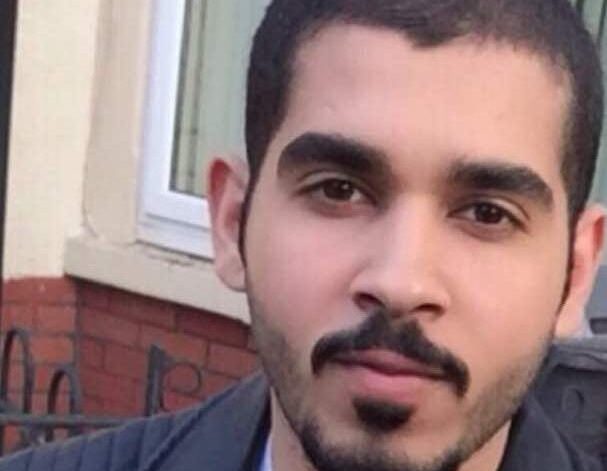26 June 2017 – Amid an ongoing campaign of reprisals against human rights defenders and political activists, Bahrain’s National Security Agency (NSA) has repeatedly targeted Mohamed Hasan Ali Mohamed Juma Sultan, the son of a former parliamentarian for the now-dissolved Al-Wefaq opposition group. Americans for Democracy & Human Rights in Bahrain (ADHRB) condemns the recently expanded role of the NSA and calls on the Government of Bahrain to immediately end all forms of retaliation against activists and their families, including Mohamed Sultan.
Mohamed Sultan is the 23-year-old son of Sheikh Hassan Sultan, a former member of Bahrain’s Council of Representatives, the elected lower house of the National Assembly. On 22 June 2017, Bahraini authorities summoned Mohamed Sultan for interrogation at a government facility in Muharraq. Once he arrived, Mohamed was reportedly beaten by NSA officers. Sources tell ADHRB that the officers insulted Mohamed’s father and threatened him with rape. Mohamed was ultimately released after several hours of interrogation, but when he attempted to travel the next day the authorities blocked his exit and told him to report back to the government facility. During this session, NSA officials reportedly tortured Mohamed and pressured him to become an informant in order to help them target his father and other political figures. The officials released Mohamed after fourteen hours, but summoned him for a third round of interrogation the following day, 24 June. Though he was ultimately released after this session as well, the authorities summoned Mohamed for fourth round of interrogation today, 26 June.
Sources tell ADHRB that Mohamed Sultan is not politically active, and it is believed that he is being targeted solely in connection to his father’s role as a member of the opposition. The government has previously subjected Sheikh Hassan Sultan to judicial harassment in reprisal for his political work, including arbitrarily revoking his citizenship, and it formally dissolved the Al-Wefaq political society in 2016. Additionally, the current targeting of his son comes several days after Sheikh Hassan Sultan was defamed in Saudi and Bahraini media and accused of conspiring with the Qatari government “against the Gulf states’ unified policy in Bahrain.”
Mohamed Sultan’s case also comes on the heels of consistent and increasing allegations of NSA abuses. On 5 January 2017, the Bahraini government restored law enforcement powers to the NSA, authorizing it to make arrests for the first time since 2011. The move reversed one of the only recommendations of the Bahrain Independent Commission of Inquiry (BICI) that the government had implemented, following the BICI’s findings that the NSA was deeply implicated in torture and even extrajudicial killing during the suppression of the 2011 pro-democracy movement. In addition to an April 2017 constitutional amendment allowing military courts to try civilians in national security cases, the re-empowerment of the NSA has given Bahraini authorities wide latitude to apply and enforce the country’s anti-terror legislation – an excessively broad legal framework that effectively criminalizes many forms of peaceful political opposition.
Since January, the NSA has been repeatedly implicated in severe human rights violations. On 26 January, masked gunmen raided a peaceful sit-in in the village of Duraz, fatally shooting 18-year-old Mustafa Hamdan in the back of the head. The raid bore the hallmarks of an NSA operation and it is suspected that the agency was involved in the attack. On 25 May, the NSA summoned human rights defender Ebtisam al-Saegh and subjected her to extreme psychological and physical torture, including sexual assault, in retaliation for her work. Al-Saegh had recently returned from the United Nations Human Rights Council and was among a number of activists targeted for intimidation and reprisal in recent weeks.
“The decisions to re-empower the NSA and expand the military courts have the explicit approval of the king, and they represent a full-throated endorsement of Bahrain’s move toward a police state,” said Husain Abdulla, ADHRB’s Executive Director. “Now, with the NSA apparently seizing this opportunity to launch a renewed campaign of reprisals and intimidation against activists and their families, it is inconceivable that there isn’t coordination at the highest levels of government. Bahrain’s allies must make it clear that such flagrant repression will only further destabilize the country.”
Bahraini authorities must not be allowed to target and intimidate civil society actors with impunity. It is particularly imperative that Bahrain’s partners in the United States, the United Kingdom, and the European Union leverage their relationships to bring an end to this campaign and encourage substantive human rights reform. We call on the Government of Bahrain to immediately cease all reprisals against activists and their families, including Mohamed Sultan, and to re-implement the BICI recommendation to restrict the activities of the NSA.





